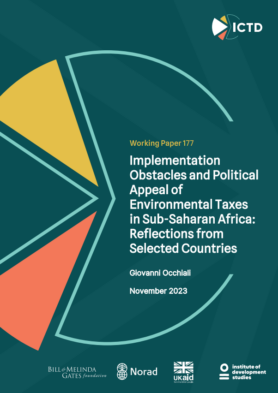Working Paper 177
Increasing the slow pace of adoption of environmental taxes across low-income countries has become a significant priority among international financial institutions, multilateral development banks, and international donors. Yet little is known about the practical institutional, administrative, and political obstacles that have led to their slow implementation and how they can be made more appealing, especially across sub-Saharan Africa. Based on an extensive literature review and 16 in-depth interviews with ministries of finance, revenue authorities, and other government stakeholders across six African countries, this paper provides some evidence that will support action and research on this theme. While there are differences across the countries covered, a lack of data and analytical capacity to develop effective environmental taxes is a common theme, as well as the historical prioritisation of their revenue mobilisation capacity over their environmental impact. A great variety of government actors with a mandate over natural resources, often with competing policy priorities, coupled with a lack of coordination fora, has also impeded the harmonisation of the environmental charges they levy. These measures are also often perceived to be regressive and to pose an obstacle to industrial development, lowering their appeal, given that poverty reduction and employment creation are an overarching priority. Nonetheless, support for introducing specific environmental tax measures exists across the population and policymakers, especially if their revenue can be earmarked for environmental purposes.
